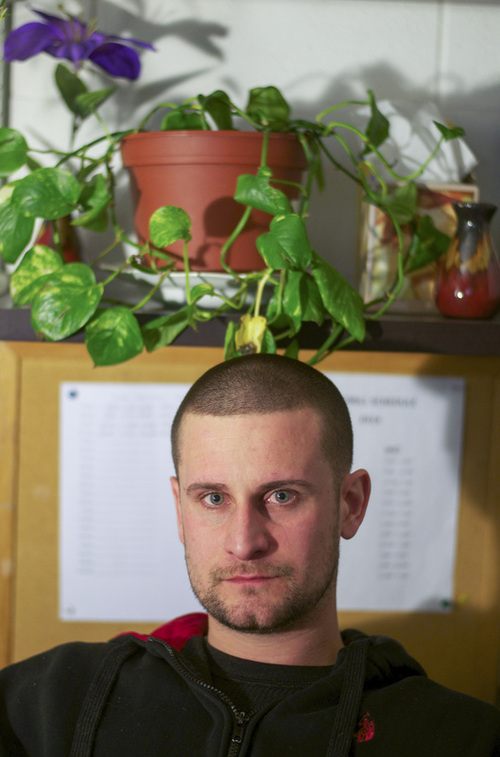 Jeff Caulfield is a night manager at Safe Harbor. "Safe Harbor is a place where people can come and get their lives back in order. There's people here from all different aspects of life that are just in rough time or going through addiction or coming out of jail. We're a recovery-based place and everyone here has to stay sober. We have a free medical clinic. We have a clothing room for day people and people that live here. We have up to 36 residents at a time, 24 males and 12 females and we have a day program which consists of up to 60 people. We feed them breakfast and lunch every day. It's a great place. Since I started working here, it's changed my life as much as we change other people's lives. I had a troubled past myself and this is helping me stay on the right path."
0 Comments
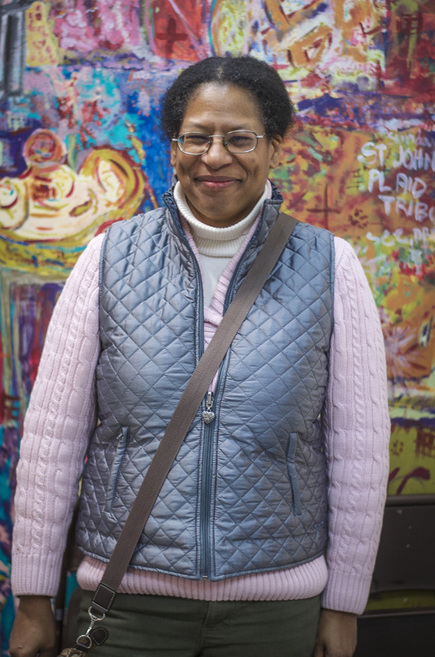 Judith, who has always dreamt of visiting London and is also a poet and aspiring screenwriter, is a resident of Safe Harbor. "I grew up in Metuchen, New Jersey, a doughnut hole (Editor's Note: Metuchen is smack in the middle of the Township of Edison, New Jersey), and everybody knows everybody. Didn't realize that one day I'd run into a number of rough problems and find myself actually having to go to a shelter. I didn't even realize that they existed, but I'm glad they did. Flash forward years later out of Metuchen, I'm fifty-four years old, not expecting to be in a shelter again, but I am. I had no heating oil--that ran out--pipes burst. Water came down. What do I do now? I have no money, no job, no anything. I'd been looking for a job for several years; still nothing. And then, out of the blue, there was an article in the paper about the church a street from where I was. So I walked up the street, went in, and these people were super from the second I got in the door. I mean, you don't get that in Metuchen; it's every man for himself. Here it's a completely different story. Before I knew it, I was in Safe Harbor." "What do you want people to know about what it means to be homeless?" "Homeless can be anybody. It's a person who has no home, not a permanent one. You can be from any walk of life. You can be rich or poor. Things just happen. For me, it was my mother was sick. I took care of her for two years and she died and left me with nowhere." 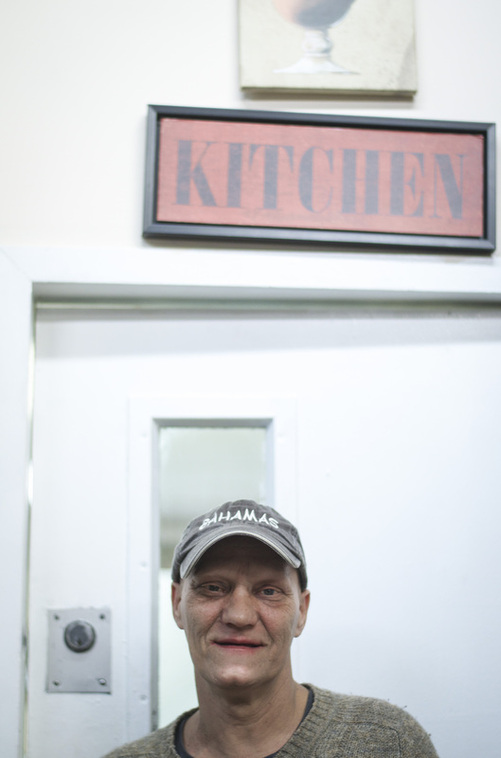 The day I'd interviewed Ed last week, he told me he had just that day reestablished contact with his son after fourteen years. He was happy and felt at peace as he told me his story: "I'm not a resident; I was at one time. Through my teenage years and most of my adult life, I was an addict. My purpose in life was to go to work and make money to get high. I went to a couple of different rehabs through pressure from other people, got out, and did the same thing. January 2nd of last year, I put myself in rehab. I'd had enough. I went though their program, got out, and I went to work for this guy. Work ran out and I didn't know how to handle that, so I relapsed and for about a week I was getting high and drinking. I got another job flipping apartments, and I was owed three thousand dollars, but I was basically blown off. I went to an old habitat that I used to frequent and I stayed there: there were all these drugs there. Did that for about a month and I had enough. I came down to safe Harbor and I got in here and cleaned my act up. I started working down at Sette Luna, but it didn't last very long. I always had a knack for cooking; I'd always watch my grandmother do it, by her little side--I was the eldest grandson. I was here for awhile and my friend had a major heart attack. Me and my friend went to see him, and I'm getting' older, you know, and you start looking at your own mortality. I left with my friend, we went to his house to watch football and he offered me a beer and I drank it. I didn't come back to Safe Harbor that night, which pretty much you;re out the door for that. hey were calling around looking for me 'cause I'm a diabetic, and they were afraid something happened to me. I called the secretary from work, told her what happened, and she said, 'Are you coming back?' I said, I guess, if I can, but I don't know if they'll let me.' When got here that night, I wasn't allowed in. Later I talked to them and I said, 'If I gotta leave, I know I brought this on myself and there's no animosity there.' We made some conditions and they let me stay." Ed has since gone to NCC for culinary arts and cooks for the residents of Safe Harbor. 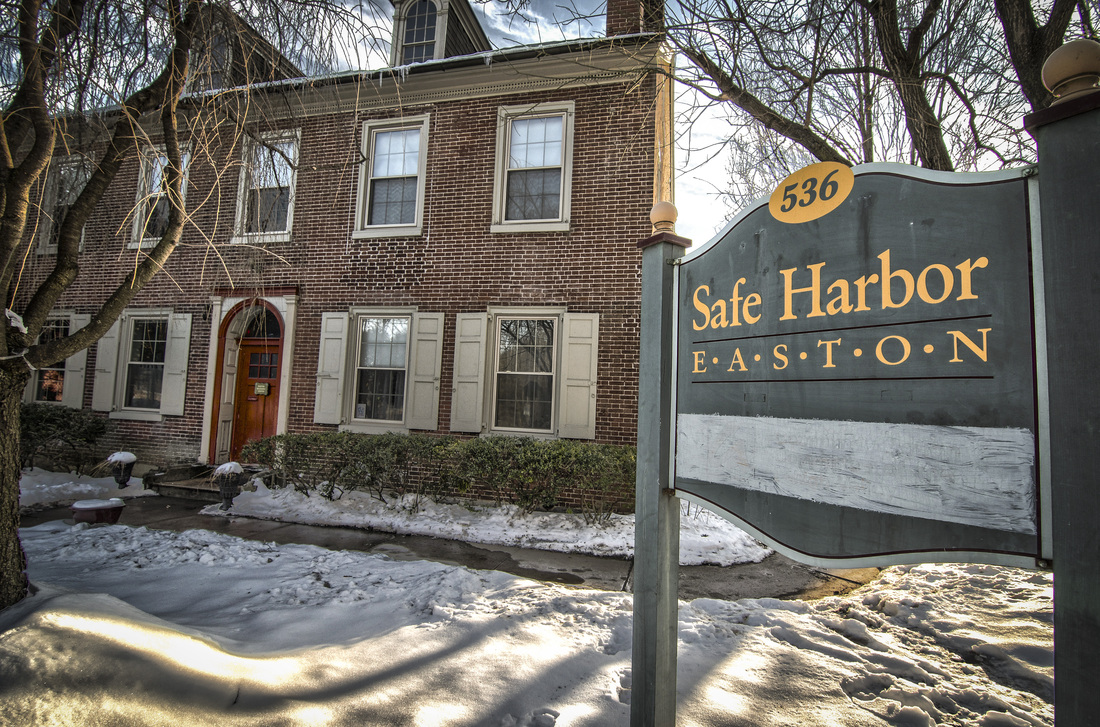 Beginning tomorrow, we're going to feature, through an occasional series, the residents and others of Safe Harbor Recovery Center. I have had the privilege of talking to some of the people there and it has been an honor hearing their stories of difficulties and triumphs, hardships and recovery. I will be featuring more of their stories from time to time. I want to offer a heartfelt thank you to Sean and Jeff for letting me in. 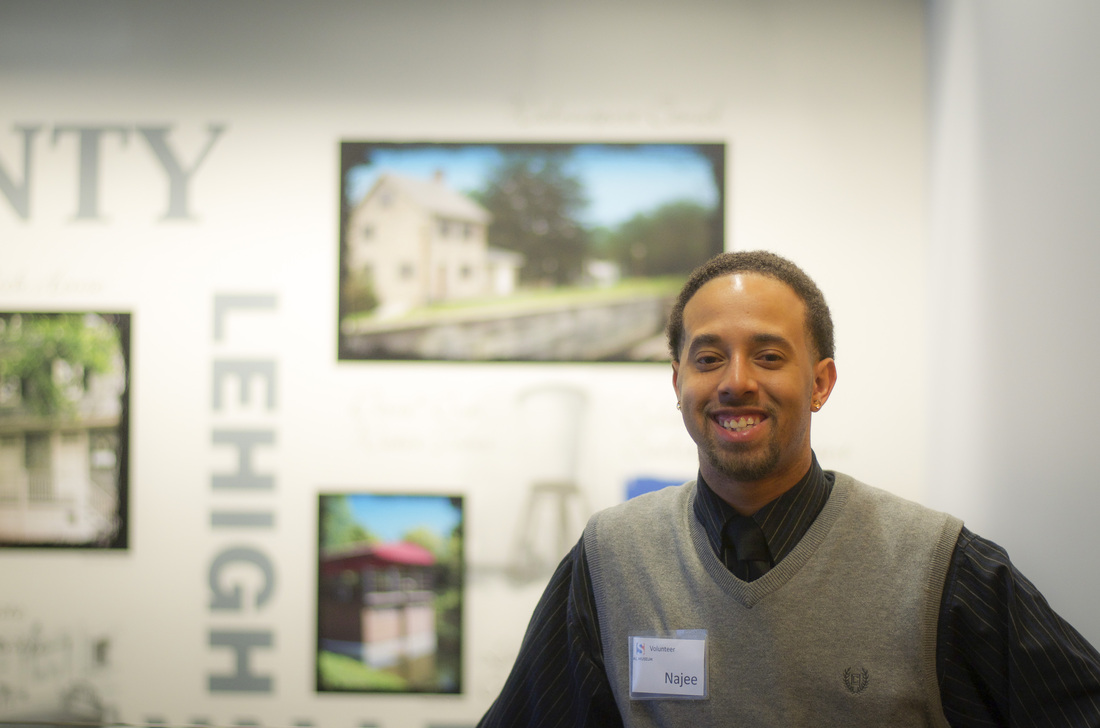 Najee, a 2007 graduate of Easton Area High School, is a docent at the Sigal Museum on Northampton Street. He explained what brought him there: "Just a love of history, learning where we come from to know where we're going. especially because I love Easton as a city and I want to give back. To get a sense of where we're going, you gotta think back how we got here. It's a good thing seeing the youth here; I mean, that's the future. If you can get to them and get them out of the things that destroy their lives instead of making it better, like violence and gangs and drugs. And that's what I want to do, is open a school so they can learn and play and just have fun and have somewhere to be instead of hanging out on the streets." 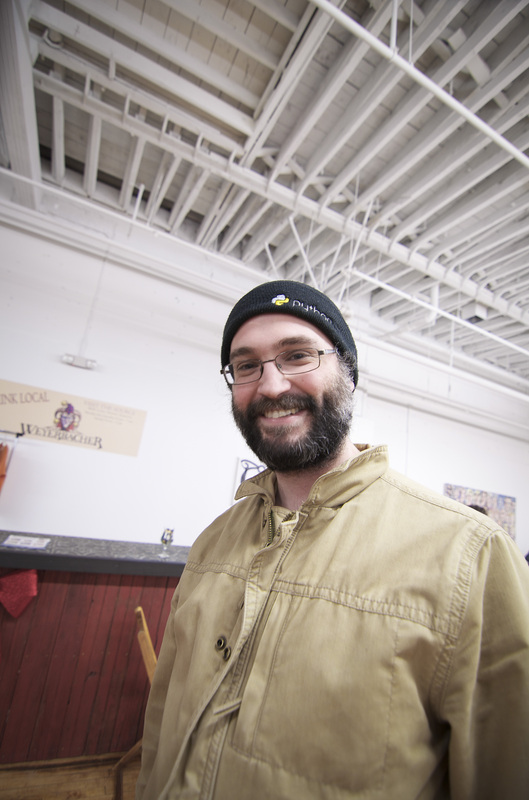 "I was kind of raised to be cognizant of those around me; it was kind of baked in. My whole life has been around holistic living. I was raised with being mindful as a root tenet of life. I've been a vegetarian my entire life. Basically through that type of a path: Be conscious of what's going on; be mindful of the people around you. Be conscious of what the meanings are. Try to be somebody who's taking a perspective of the observer rather than the actor." 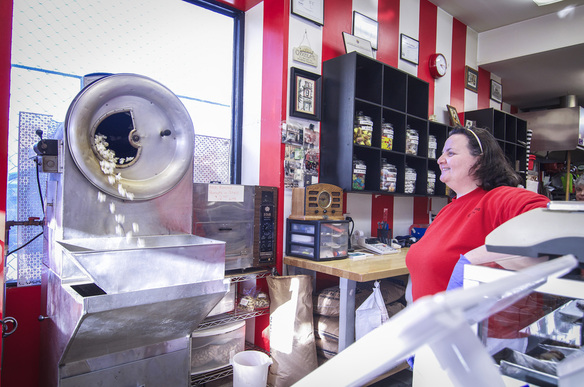 Sia Bassil, owner of the Carmelcorn Shop, 62 Centre Square, and her 55-year-old popcorn machine show how it's done. She explained the long history of the shop: "We opened in 1931. It was owned by a gentleman and his wife, John and Ruth Dougherty, and then I worked for them in '77. I stayed on, and in 1986 he sold it to Richard Bascomb, and then I bought it from him in 1996." "So what makes you love owning the shop?" "Well, it's all I knew how to do growing up; I was 14 when I started, and he was up in years and he told me a lot about what he does. I like it, I love the people, you have that one-on-one communication with the customers, and I just love the business. no two days are the same. Every day's something different." "How do you keep from eating everything in the shop?" "Oh, I think the smells overwhelm me. The aroma is what fills you up!" 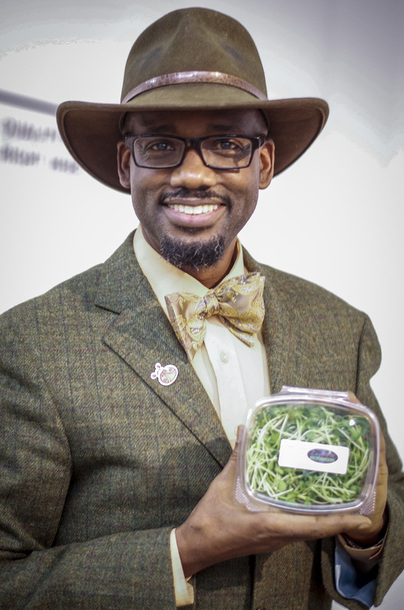 Shas Tahum Shep-Nu, owner of Umble Farms, specializes in microgreens. I asked him about his business and exactly what microgreens are. You can find him at the Farmers' Market Winter Mart every Saturday. "Microgreens are harvested from five to twelve days after they're sown. Because of that, they have four to forty times the nutrient value of the mature plant." 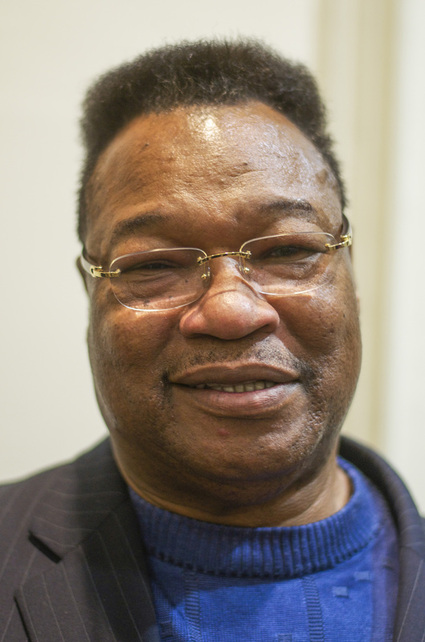 "What do you love most about Easton?" "It's home. And home is the place to be. When you leave the town and you want to go home, where do you go? Easton. Easton's home, man. Been my home since 1956, and I've been here ever since." "How has it changed since then?" "The improvements: the city's getting better; people are better. I mean, we're getting a lot of outsiders who really don't know how we are and they're surprised when they come in and everybody's friendly. And that's what makes it home. A *real* home." 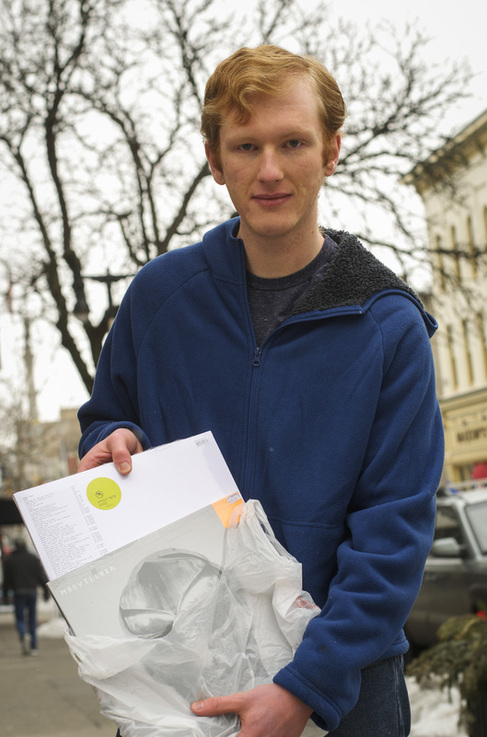 "I got into vinyl about a year ago when I started listening to various records on Youtube and learning about how audio encoding works. Ever since then, i've just been buying records and learning more and more about the music that I listen to. It's pretty great. I've met people that I never would've otherwise met and learned things that have helped me a lot in areas from biology to chemistry and math. Right now I've been listening to a lot of Aphex Twin. It's kind of ironic to listen to him on vinyl because he's an electronic composer." 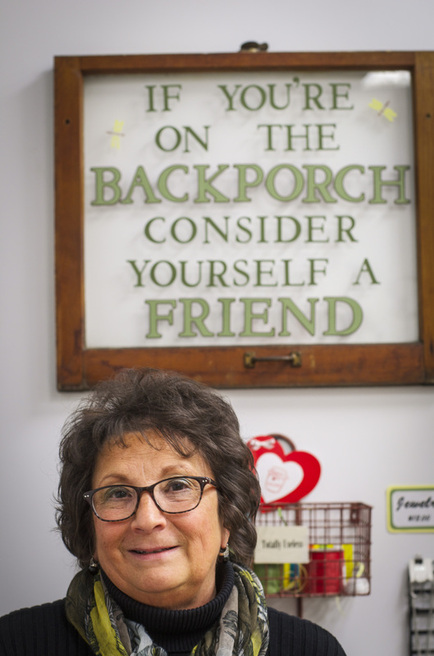 Grandma's Back Porch is actually a mixture of two diverse businesses. Owner Kathy Bechtel tells us about what you can find there. Pictured is Pam Panto, who works there: "Micro nuts, bolts, hardware for mainly remote control airplanes, cars, trains, jewelry makers, clock makers, eyeglass makers. We also do government work. That's our main business. Now, Grandma's Back Porch came about because we wanted the space for micro fasteners, but we needed something retail for downtown Easton to draw customers to the area. So, my girlfriend Kim Heimbach and I came up with Grandma's Back Porch. It's gifts and home decor, stuff that we like, and most of it's one of a kind. A lot of it's by local artists. A lot of them have come in and asked if we'd put their work in our store. We're open to putting anything in here by local artists." 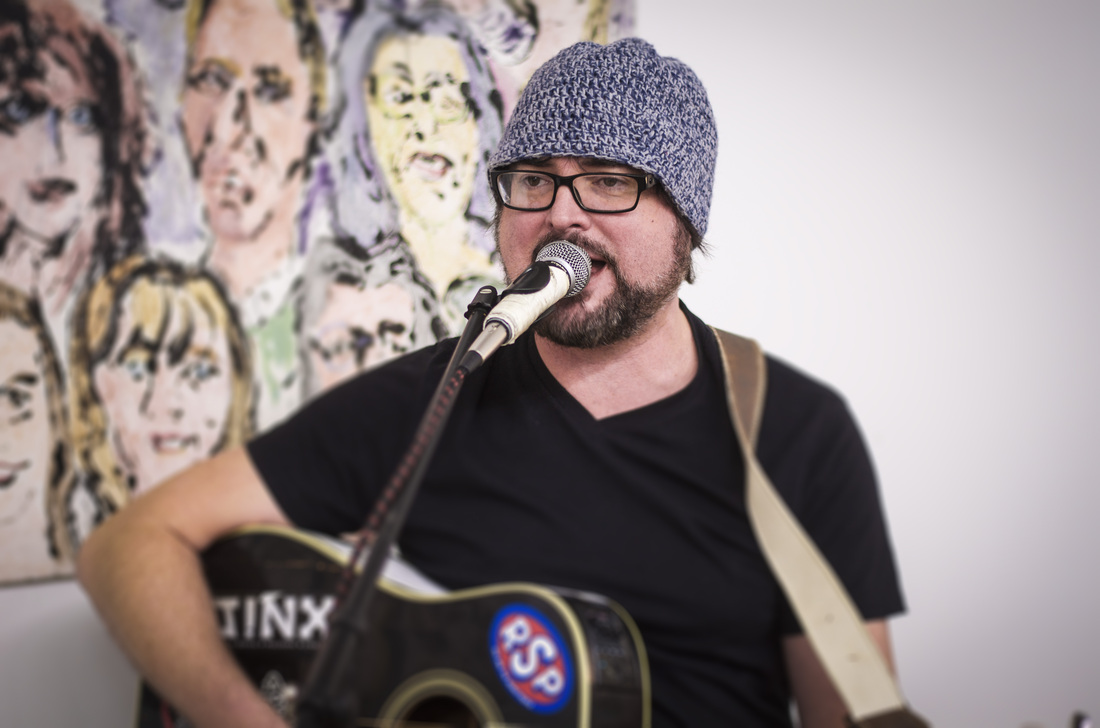 I've always wondered why Mike Roi calls his band "The Secret People." Now I know why: "The Secret People came about through a bunch of different friends of mine. I never knew who was going to play from one show to the next, and it was a revolving door of a bunch of friends in New York City. So I just called it 'The Secret People' because it was always a secret to me of who was gonna play with me from gig to gig!" 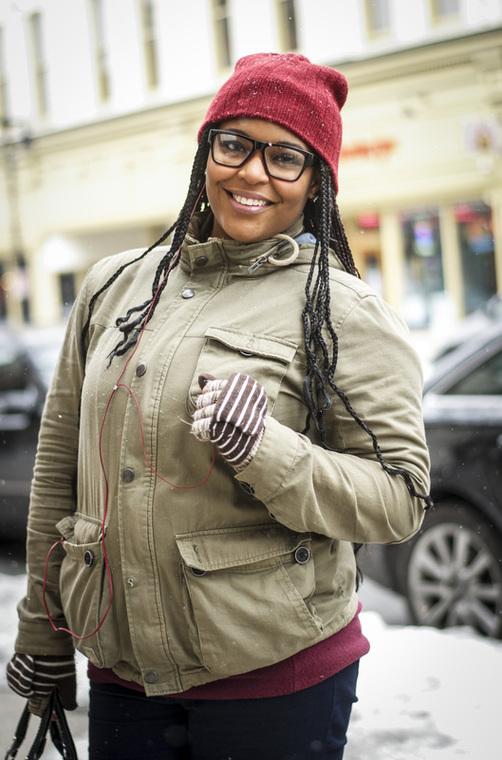 "My mom, she's moving all the way down South. I'll be up here by myself with my son and his father, and it's both our first child. I never thought that my mom would move so far away. I just thank her for instilling into me what a great parent should be like, so now I don't worry about it anymore. She's able to go live her own life and do what she wants to do." "What was the most important lesson she ever taught you?" "Always smile first and keep your children first. You can laugh later." 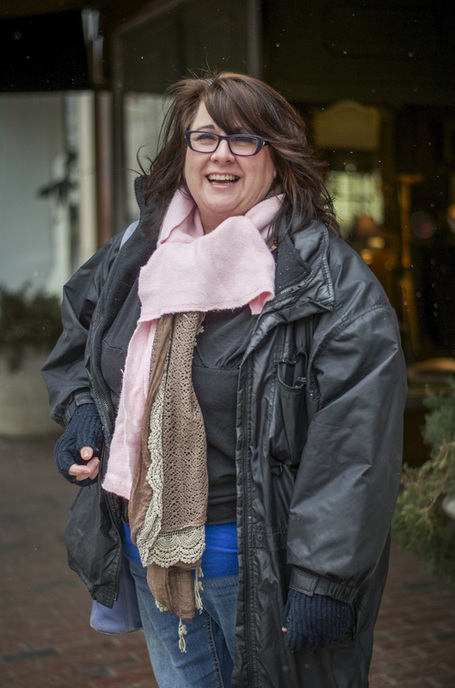 "One of the coolest things that ever happened to me was when one of my friends found out I hated Christmas because I'm in retail, and he got all of his friends to decorate my house. It was so cool--it was a surprise. I never had enough money to buy gifts or decorate how I wanted to. I didn't have time. So, they made dinner, they decorated the house: they brought 200 ornaments because they had tons of Christmas stuff. They did my whole house: the bathroom, the doors, the front, and made dinner. And it was freezing out and they all got dressed up in their fanciest clothes. So when I got there at night, they were all dressed up, they had a big dinner made, and my house was all decorated. It was amazing." 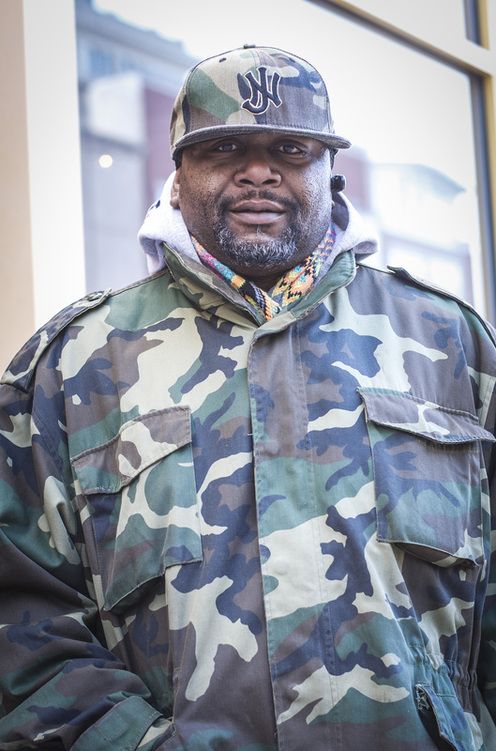 "I needed a new start just getting my life together. Y'know, as a young'un I did things that were stupid, so you pay for those things as an adult: You try to do everything that you can to right what you did in the past so you don't relive that same thing over and over again. Moving forward, you gotta close the doors on the old chapters." 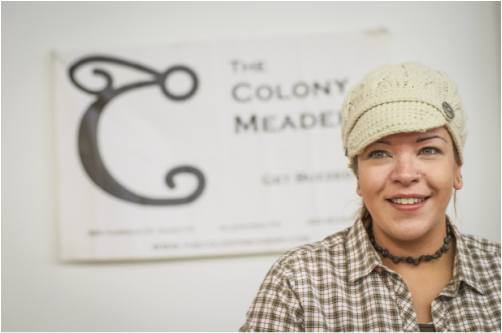 Liz, a sales rep for the Colony Meadery (which sells its mead at the Farmers' Market Winter Mart), tells me about one of the oldest drinks in the world: "The origin of mead dates back thousands and thousands of years to different cultures: Vikings, Egyptians. They all knew what they were doing with honey. Basically, it's a fermented alcoholic beverage made from fermenting honey, so it's all natural. Water, yeast and honey are the basis for all of our recipes, and then everything else after that is either flavored or infused with things like fresh fruit, coffee--almost anything you can think of for your palate. Whatever works for you, from as dry as can be on up to as sweet as can be. My favorite depends on what mood I'm in, but some of our flagships like the traditional 'Straight No Chaser' or orange blossom honey. There's 'Favorite Child,' which is a raspberry-chipotle mead, so you get the sweetness and then the spice comes through at the end. That one really treats you well." 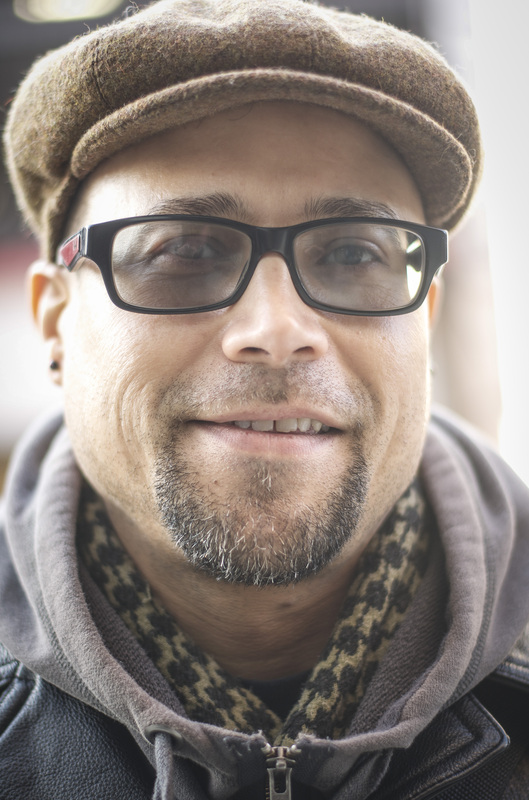 "Yeah, you try to depend on other people and you find you gotta pull yourself out of the hole sometimes. Financially, I got laid off, and job security… I wasn't focused on those things when I was younger and now as you get older, you realize you need job security. I finally found what I like doing, which was computers the whole time. I was doing it as a hobby when I was younger, but it was obviously what I was made for, but I was still looking and indecisive, so I overlooked certain stuff. But I finally landed a good job." "What do you think causes indecisiveness in us?" "I mean, you have religion, politics, issues at home, you know, like partners and stuff like that. So, you know, constant distractions that pull us away from you doing what you need to do for yourself." |
These are the stories of the people of Easton, PA Archives
August 2018
|

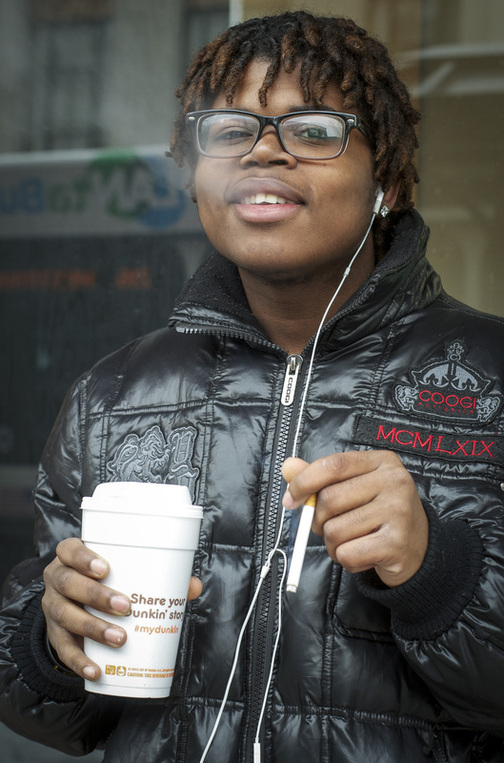
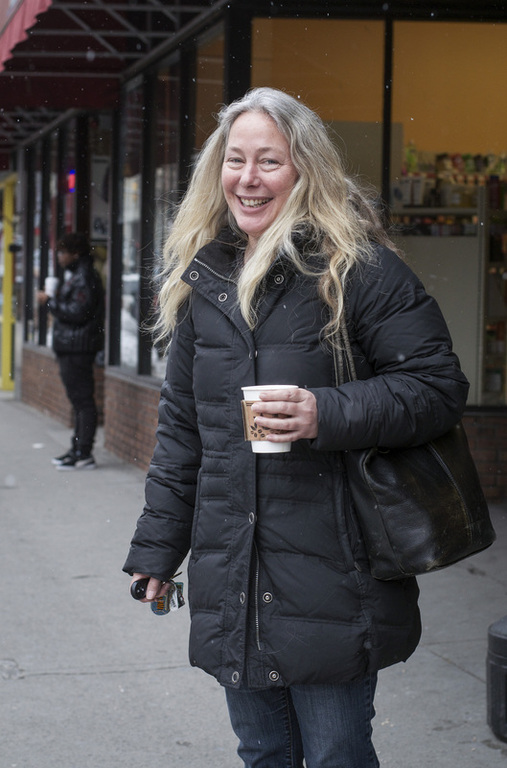
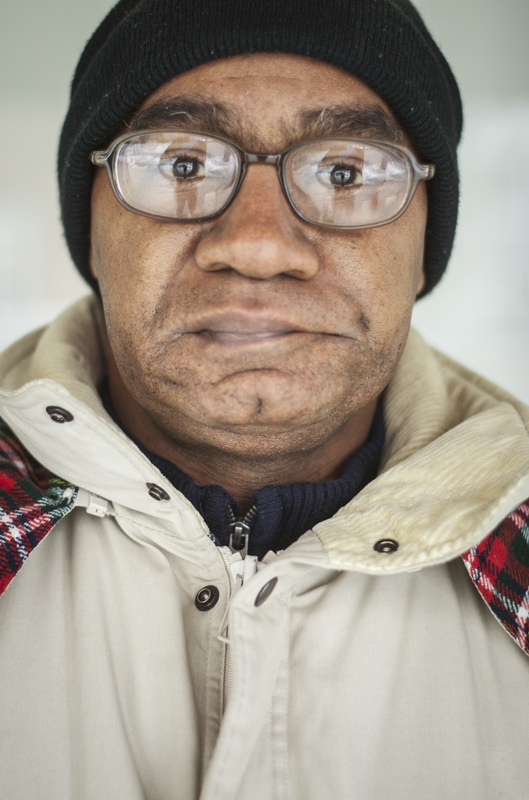
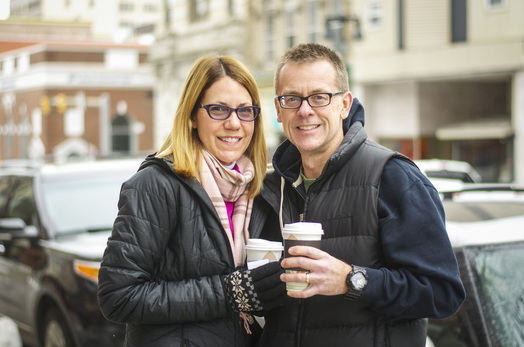
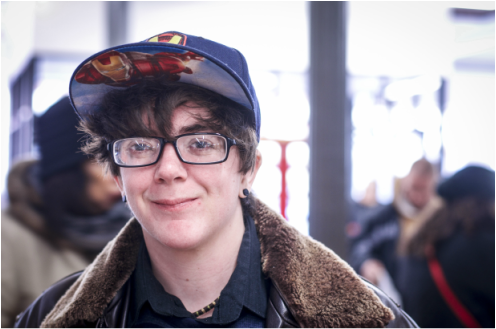
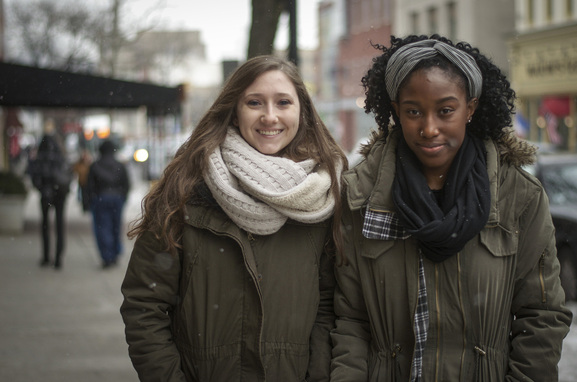
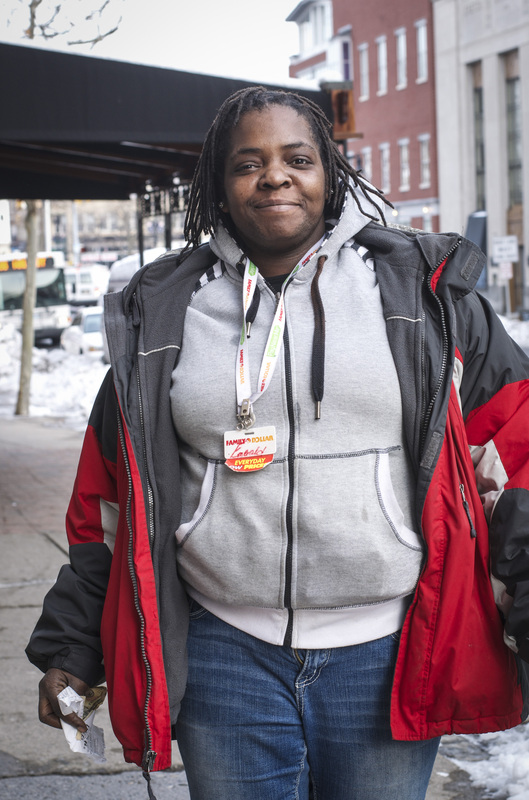
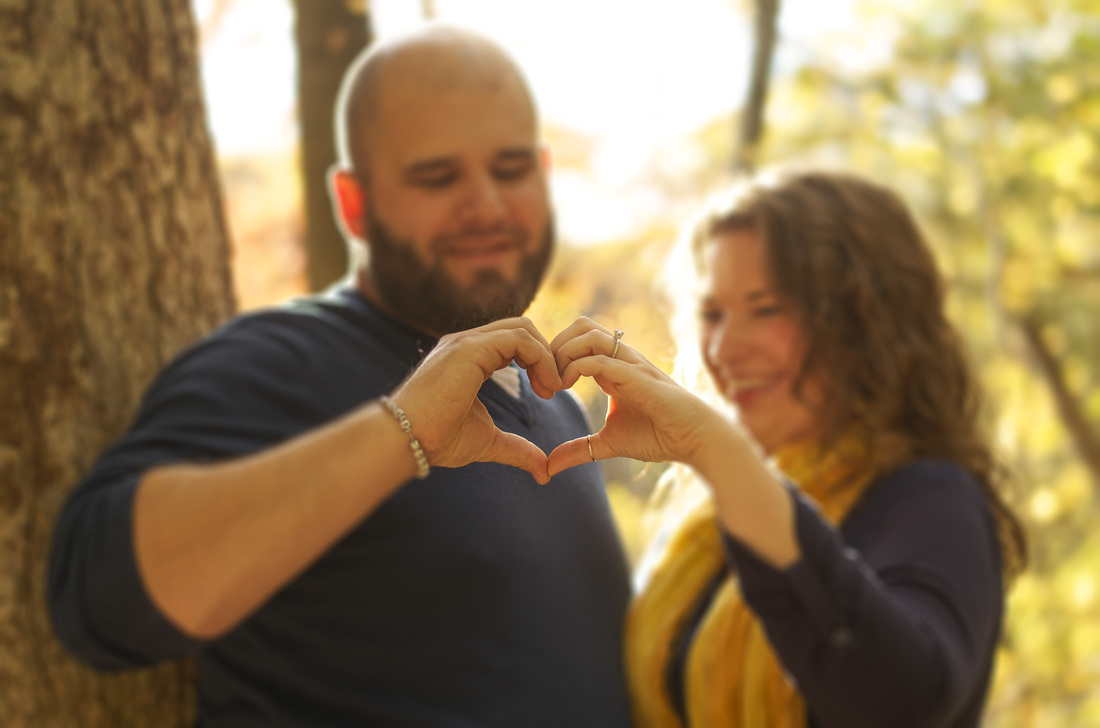
 RSS Feed
RSS Feed
